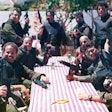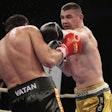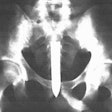We will call the author of the article below Geronimo. (He knows why.) He is currently a resident of one of California's most secure prisons, doing "all day." He is a former member of the Mexican Mafia and was inspired to write this and send it to me in response to some of the comments posted on my gang blog last month. He is a real man, redeemed from the gang madness. —Richard Valdemar
One common thread tying together those who break the law and those who enforce it is their mutual realization that life is a messy affair and one "has to do what one has to do" in order to succeed. The rest, apparently, isn't all that clear.
It had already been a long day when I read Richard Valdemar's recent column about our society's fight against organized crime, in this case, the Mexican Mafia. As usual, in a concise and clear manner, it's easy to see where Mr. Valdemar is coming from and who he is gunning for.
As a young cholo running wild on the streets of East L.A. and then in the prison labyrinth, I was his designated target. Neither of us suspected that many years later "Tom" and "Jerry" would share something more than an interrogation room. Life is full of surprises, and I'm still scratching my head about this one.
The blog post, "The Mexican Mafia: Down But Not Out," was only a side dish. The subsequent comments were the main course. You see, Mr. Valdemar quotes two former Mexican Mafia members, who offer their perspective on how to hobble their former friends.
One of the readers had the following to say about the sources: "You both disgust me both of you are trash and coward traitors, how does it feel not being able to look at yourself in the mirror with any pride do you feel ashamed to look at yourself in the mirror and see the rat staring back at you? You both are living your life like rat cowards hiding in the dark! Hope you have a very miserable very short life left!"
This is the poetic justice of living in a free society: convict sentiment can be found even on a police Website, and no one will yank you out of bed at night and put a gun to your head for "betraying the party line." The cruel irony, however, is that I read this comment on the 12th anniversary of the 9/11 terrorist attack, on a solemn occasion in our nation's not-so-distant past, when 19 dedicated and focused men, who certainly can't be faulted for a deficit of pride, who—by the commentator's standards—were neither "cowards" nor "traitors."
They weren't troubled by their image in the mirror (this much we gather from their wills and testaments, which gush with "honor" of being "chosen for the mission"), and who immortalized themselves in a shocking blaze of destruction and infamy at the expense of thousands of innocent and unsuspecting persons. Indeed, it is a long and miserable day, when—as a Christian—I'm tempted to agree with Friedrich Nietzsche, that in this world, "Morality is the ethic of the weak."
But the scorn of today's "supermen" isn't limited to turncoats and gangsters who—for whatever reason—drop out of their gangs or become the State's witnesses. You see, this isn't about strange comments or perspective, or even about the sort of society one desires to live in: one controlled by crime syndicates or one governed by at least a semblance of some order.
For us, who grew up on the streets, who ran through the gauntlet of state facilities, who even managed to ascend to the pinnacle of gangland stardom, we didn't need to take Biology 101 in order to become staunch Darwinists. With every cell in our bodies we believe in "the survival of the fittest," and in the "natural selection" of weeding out the "weak species." Might makes right in our world, but is that the sort of reality you seek?
Strength, in terms of power and control, is an asset only when the reflection in the mirror is yours alone. When others crowd that image—when family, children, neighbors, society remind us of our natural commitments—then strength is often a liability.
Ask the elite Mexican federales why they cover their faces with black masks and shun any mention of "meritorious service" after successful operations. Ask them what happens when a news report commends them on a "job well done." It is not these professionals who are ambushed in their homes, whose throats are cut, who are raped and beheaded and shredded into bits, but their wives, their siblings, their children, their parents—none of whom are a match for ruthless murderers stalking them based on some media leaks. The law is a bridle unto itself; the criminal world is bridled by nothing.
As a former prison gang member, I'm ashamed to look in the mirror because my failures are staring back at me: how I failed as a man, as a provider to my family, as a husband to my wife, as a father to my children. The men whom I've murdered are staring back at me, as are their families. I hope that God will forgive me for "not feeling any pride" about myself.
Adolf Eichmann, the zealous Gestapo chief, who oversaw the murder of millions of Jews in concentration camps, was asked to admit his guilt and to repent shortly before his execution in an Israeli prison in 1962. The stoic butcher (who also managed to be a warm family man and a lover of the classics) said that he did what he thought was right and that he was dying as a faithful son of his fatherland. The demonic dazzle of his cell mirror must have blinded him to sanity.
The tragedy of the Mexican culture, of the gang cancer which is devouring us, which I zealously embraced and promoted, is that the concept of warrior machismo seems to always lead back to Huitzilopochtli's bloodthirsty temple. The god of war requires human sacrifice, and as one ascends to the altar, the steps become narrower, slippery with the still-warm blood of victims.
There is no room of others at the top; it is a barren plateau where love, lives, and losses must tumble down the filthy steps and be discarded like dead weight. This is easy to do when your cause is your god. Even then, sooner or later, you know that this god will cut out and devour your heart as well. Have you been there, at the altar? Have you seen what it looks like? Have you made the sacrifice? I hope you never will know those steps.
Sooner or later, Huitzilopochtli's pyramid will collapse with a loud crash, and we will see things as they are in their true light and reflection. For now, I'm content to be disgusted with myself, and spend the remainder of my "miserable and short life" trying to wash off the blood I shed in my wickedness. And that's a gift, because the world no longer revolves around my mirror.















